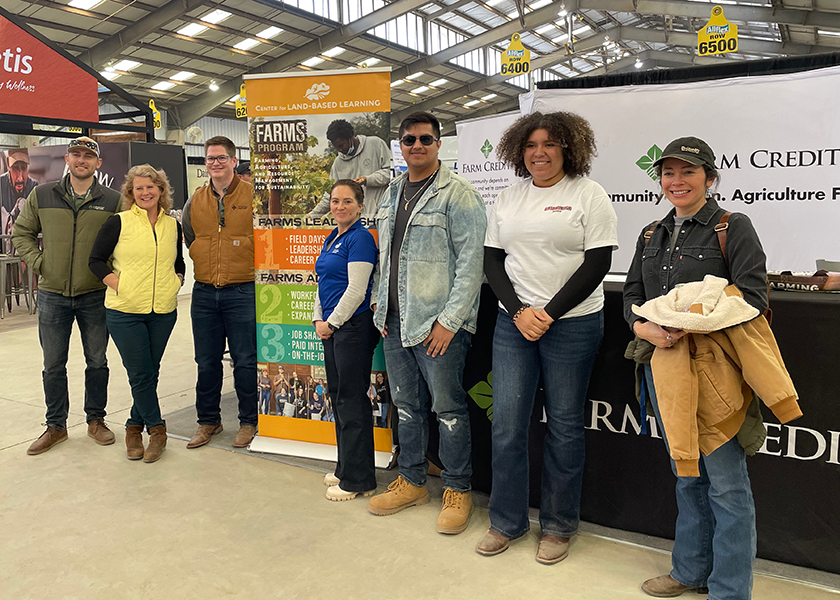How the FARMS program helps cultivate California ag’s next generation

It’s been three decades since a Winters, Calif., walnut farmer planted a seed that continues to bear fruit for the state’s agriculture workforce.
The farmer, Craig McNamara, wanted to city kids to visit his Yolo County farm to learn more about where their food originates, which led him to help found the FARMS Leadership Program, according to a news release. That initiative has since evolved into much more.
The FARMS (Farming, Agriculture and Resource Management for Sustainability) program has served diverse communities throughout California, introducing careers in ag and environmental sciences to tens of thousands of high school youth, most with no previous access to these opportunities, the release said. It is a key part of the Center for Land-Based Learning’s programming, according to a news release.
The program — which has a motto of inspire, educate, cultivate” — is designed to introduce, train and recruit about 200 high school students from major farming regions in the Central Valley, Northern California and the Central Coast each school year for college and career opportunities, says Leticia Hernandez, the program’s alumni and internship manager.
“Today, we focus on supporting the industry by teaching FARMS students professional development skills,” Hernandez said in the release. “We provide hands-on opportunities for students to practice their leadership skills while in the program. Students practice speaking publicly and working with new people almost every field day. We hold mock interviews and encourage and teach them how to be better professionals while introducing them to career possibilities.”
Career paths for participants include core positions such as harvesting and packing, as well as human resources, marketing, research and development, gene editing and breeding.
Students gain hands-on farm experience through monthly field days, a key element of the basic FARMS program.
“Each session involves about five students per school along with their teacher. By bringing smaller groups, it allows students to participate in networking, working with all kinds of people, team building and leadership activities,” Hernandez said. “But the most important part of the field day is to get them working with people on their jobs, learning about crops along the way.”
Adding onto the program
The FARMS Leadership Program is Tier 1 of the experience, in which students engage in career exploration. Two more levels were added in the past decade.
FARMS Advanced, a second-year option added in 2015, provides no more than 40 first-year students with the opportunity to sharpen and develop their workforce skills through an additional six field days.
The students work with regional program coordinators in one-on-one mentorships and on small-group field days in smaller spaces such as research labs and at companies that don’t have facilities for larger groups. During visits, participants can talk with employees about their careers and participate in mock interviews with human resources staff to prepare them for possible internships and the workforce, according to the release.
The FARMS program added a top-level tier in 2017. By providing internships in the agricultural or conservation workplace, the program offers a practical application of educational studies, the release said. This opportunity is available to those who complete the FARMS Advanced program and are interested in pursuing a career in agriculture or environmental sciences.
“Last year we started with five or so, and we had five more this year. My job is to find placements and do matchmaking,” Hernandez said.
She noted the example of a student who graduated from Cal Poly this year, was placed in an internship last summer and is starting a job as a junior ranch manager this summer.
Hernandez said the program also encourages participants to give back with a community action project. That can include environmental or agricultural projects or activities such as working in a soup kitchen, park cleanups and training elementary school students about how to care for animals.
“It’s become a beautiful program that is inspiring for students and everyone watching them grow,” she said.
Program support from Farm Credit
Farm Credit associations AgWest Farm Credit, American AgCredit, CoBank and Fresno Madera Farm Credit are supporters of the FARMS program and the Center for Land-Based Learning. These organizations are part of the nationwide Farm Credit System – the largest provider of credit to U.S. agriculture, according to the release.
Promoting and preparing for the future of California agriculture is a top priority for Farm Credit associations operating throughout California, Keith Hesterberg, president and CEO for Fresno Madera Farm Credit, said in the release.
“Nurturing the next generation of farmers and ranchers is vitally important to ensure California’s agricultural industry continues feeding the nation and the world, and CLBL does a tremendous job encouraging high school students to adults to consider careers in agriculture,” he said. “Farm Credit is proud to be a strategic partner for CLBL and we look forward to continuing to work with them for many years to come.”
Hesterberg added that Farm Credit associations collaborate annually to prioritize giving to nonprofits active in California that encourage young people to consider careers in the field.
Farm Credit also backs programs to increase diversity in the industry, Kevin Ralph, California state president for AgWest Farm Credit, said in the release.
“Farm Credit is committed to encouraging diversity and inclusion in the industry, and it’s encouraging that 78% of the students in the FARMS Leadership Program are black, indigenous and people of color,” Ralph said. “Encouraging young people from all backgrounds to consider the full range of career opportunities bodes well for the future of farming here in the Golden State.”







